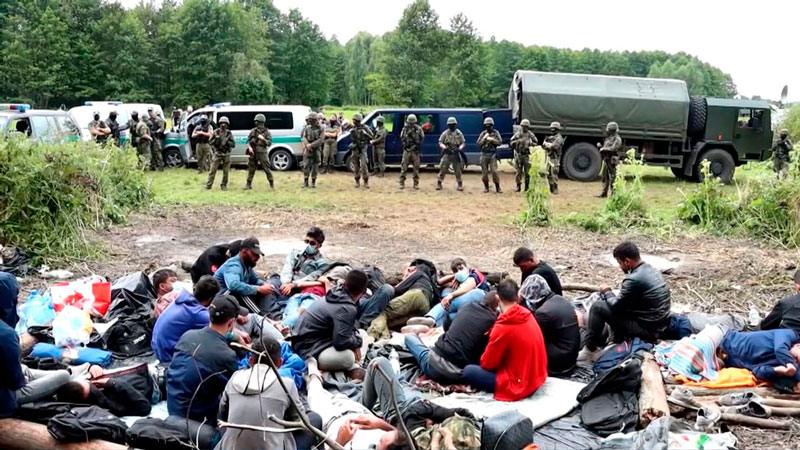Hostages by alien ambitions
Poland, Lithuania and Latvia use migrants from Africa and the Middle East to get new weapons and intimidate their own citizens
In three years, more than 50 refugee deaths have been registered on the Belarusian territory near the borders with the EU countries. Hundreds more tortured, beaten, dehydrated people, who were literally thrown through the fences into Belarus, were saved thanks to the indifference of our border guards, doctors and local residents. Why are our neighbors so cruel and what motivates them?

They don't care about anyone
Crippled by European security forces on the border with Belarus, refugees apply to the UN and the International Organization for Migration calling to stop the violence and protect them. However, no response has been received yet. Meanwhile, the situation is taking on a terrifying scale.
The other day, the Belteleradiocompany's TV News Agency presented a documentary with the speaking title "Inhumans". Footage shows migrants who suffered at the hands of the security forces of Poland, Latvia and Lithuania.
One story is worse than another. A pregnant woman from Somalia was beaten with batons by the Latvian military and left to die at the border — the child could not be saved, and doctors from Verkhnedvinsk miraculously resqued the woman. Another example: sisters from the Congo were pushed into the Belarusian territory by security forces using a stun gun. Just a couple of weeks ago, the Polish police set the dogs on five migrants from Syria and shot at them. When the unfortunate people could no longer move on their own, three of them were just thrown onto the Belarusian side of the border. What happened to other two is unknown...
International migration has become a serious problem for the countries of the European Union, Anatoly Boyashov, analyst of the Belarusian Institute of Strategic Research, says:
“Historically, this has been facilitated by the purposeful attraction of cheap labor from abroad by the leading EU states. On this topic, business has been built for a long time, careers are being created, and new political parties are emerging. The flip side of the coin was the problems of increasing crime, parasitism on social benefits, the complexity of interethnic communication, as well as security threats.
For Poland and the Baltic States, the issue of refugees became relevant during the coronavirus epidemic.
"After introducing border crossing restrictions by the EU countries, the flows of illegal immigrants really shifted from the southern to the eastern borders of the EU. Due to the fact that the route through Ukraine to Bulgaria, Cyprus and Greece involved additional financial risks, transporters began to think about alternative routes to Germany. The business, which relied on the first waves migrant diasporas, migrated from the southern EU countries to the eastern ones, especially to Poland," the expert draws attention. "As a result, from 2021 to 2023, the Polish Foreign Ministry issued about 250 thousand visas to those who arrived from unfavorable African and Asian countries. But the refugees did not stay in Poland itself. Since multiple Schengen visas had been used to travel illegally to Germany, the large-scale issuance of visas raised reasonable questions to Warsaw related to the threat of penetration of radicals. Subsequently, this situation resulted in inspections and a loud corruption scandal: it came to the detention of the deputy head of the Polish Foreign Ministry, Piotr Wawrzyk, on suspicion of accepting bribes. This was followed by Olaf Scholz's open threat to close the German-Polish border.

All means are good?
Today, trying to direct the hyped migration issue in a direction that is beneficial to them, Warsaw, Vilnius and Riga are pursuing several goals at once.
"EU citizens are being deliberately frightened by a possible dominance of migrants. That is why the issue of the "threat of thousands of illegal immigrants from the Middle East and Africa" was put to a Polish referendum on the same day as the parliamentary elections in autumn 2023," Anatoly Boyashov recalls. "What is the result? Based on a sociological survey by the Polish Economic Institute, 86% of Poles already believe that migrants in one way or another pose a threat to local workers."
The migration issue, according to the BISR analyst, will be the basis for the struggle during the presidential elections in Poland in 2025. It is expected that the electorate will support those who more effectively stop migration flows from the East, and also know how to negotiate with politicians in Brussels on the issue of migration quotas in the EU.
"All this is consciously linked with the image of the enemy in the face of Belarus and Russia. According to Polish Foreign Minister Radoslaw Sikorski, it follows that 90% of illegal migrants "have Russian visas" and "are entering in order to attack the EU." In Warsaw, politicians are competing for the title of "the best fighter against Russian agents”, and Polish observers even claim that there are Wagnerians among illegal migrants,” Anatoly Boyashov says. "And this is despite the fact that, according to Western intelligence agencies, the situation on the borders is calm: this was recently stated by Aurimas Navys, head of the Lithuanian Information Security Agency."
It is obvious that politicians are using the escalation of the situation to obtain extra funding from rich Western countries, primarily the United States and Germany.
"Promoting migration threats allows Warsaw to bargain skillfully with Washington and Brussels. In recent years, a coalition of 15 countries has been formed that does not accept the EU migration policy on the migrant resettlement," the expert explains. "Poland is intensively militarizing and is actually creating the largest land army in the European Union. Washington will provide Warsaw with $2 billion to upgrade troops, purchase F-35A Lighting II, Patriot air defense systems and Abrams tanks. Against this background, nationalist sentiments are growing in society: according to some reports, Poland is ready to send regular military formations to Ukraine under the guise of thousands of "Ukrainian citizens living in Poland."
Warsaw plans to increase military spending from 4.2% to 5% of GDP in 2025, as well as to triple the number of military personnel on the border with Belarus to 17 thousand.
Judge actions
In this difficult situation, Belarus acts in a balanced and calm manner, Anatoly Boyashov believes:
"Visa-free travel and simplified entry procedures have been introduced for citizens of 38 Western countries. Such a policy is not at all aimed at mythical communication channels, as some foreign experts claim, since the visa-free regime does not apply to officials of Western countries. The Belarusian leadership is doing everything to ensure that the long-standing problems of Europe are not going from healthy to sick, and the slanted Western propaganda does not interfere with human contacts and an adequate perception of our state."
ON TOPIC
Last week, Latvia and Lithuania banned the entry of cars with Belarusian registration plates. Later, Estonia did the same. The Belarusian Foreign Ministry, commenting on the actions of the Western authorities, called these decisions inhumane and anti-humanitarian.
At the same time, the situation at road checkpoints is already tense. Queues are observed at the borders not only from cars and trucks, but also from regular passenger buses.
According to the State Border Committee, yesterday queues of several hundred cars were recorded in two directions: Lithuanian and Polish. As for freight trucks, they are in huge queues in all directions. In fact, there are more than 1.5 thousand trucks at two existing checkpoints in the Lithuanian direction. At the same time, there are queues of passenger buses. For example, there were 55 of them at the Brest checkpoint.
Only five out of 14 checkpoints operate on the border of Belarus and three neighboring EU countries. Residents of European countries also express their dissatisfaction with this issue. For example, the Biała Podlaska Chamber of Commerce and Industry sent a letter to the Prime Minister Office and a number of other Polish government agencies demanding that they stop restraining passenger and cargo flows at the borders. Due to the imposed restrictions, dozens of Polish companies went bankrupt, thousands of jobs and the profit of EUR 124 million have been lost.

